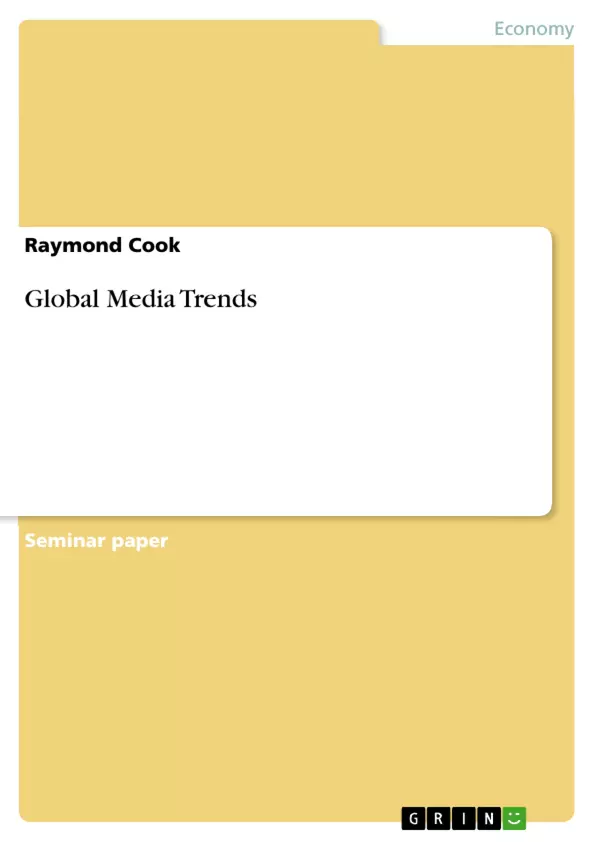1. Introduction
The media plays a very critical role in any country and the world at large. In any democracy, the media is such a critical tool towards the realization of the various countries’ development objectives. The media effectively overcomes the temptation by the government to dominate information and practice its monopoly. Moreover, there is the gradual fostering of the development of an effective and mature information culture throughout the globe. Transparency and corruption free work environments in the public and private sectors can only be realized through the watchful and critical eyes of the media at a global scale. Among others, the media performs the informing, entertaining and education roles in the society. Much as the entertaining aspect seems to be taking center-stage, the other two are equally important and critical. The society, more often than not depends on the media to be informed on the government development progress and further still keeping it accountable to the electorate. It is therefore important for the global media to be keenly regulated and all the barriers towards its development dealt with at the earliest available opportunities. Moreover, the media ownership should be fairly distributed as opposed to the government exercising monopoly in the media ownership (Doyle 2002:3).
2. Discussion of the media trends
The first media trend is regulation and deregulation of the media. Being the watchful eyes of the society, journalists and other media personalities should be given the freedom to carry out their own fair investigations and report the various matters of public concern, furnished with enough evidence. The public on the other hand, should develop trust in the media so as to submit the most accurate information when so needed. Regulatory bodies for
Inhaltsverzeichnis (Table of Contents)
- Introduction
- Discussion of the media trends
- Regulation and deregulation of the media
- Various barriers to the media development
- Media ownership
- The impact of these trends on the Emirati and Arab media
Zielsetzung und Themenschwerpunkte (Objectives and Key Themes)
This text analyzes the development of global media and its impact on the Emirati and Arab media landscape. It explores various trends shaping the media, including regulation, barriers to development, and ownership structures. The primary objective is to assess the current state of media and identify challenges and opportunities for growth. Key themes explored in the text include:- The importance of media freedom and its impact on democratic societies
- Obstacles to media development, encompassing economic, political, legal, and socio-psychological factors
- The evolving role of media ownership and its influence on information dissemination
- The impact of these trends on the specific context of the Emirati and Arab media
Zusammenfassung der Kapitel (Chapter Summaries)
The introduction emphasizes the pivotal role of the media in shaping societies and promoting transparency and accountability. It argues for the need for a well-regulated media to counter government dominance and foster a mature information culture. The second chapter examines key media trends, including regulation and deregulation, barriers to media development, and media ownership. It highlights the need for a balance between regulatory oversight and media freedom, while also acknowledging the challenges posed by economic constraints, political interference, and societal attitudes. The chapter concludes by emphasizing the crucial role of fair media ownership in ensuring diverse perspectives and promoting transparency. The third chapter analyzes the impact of global media trends on the Emirati and Arab media, focusing on government regulation, barriers to development, and ownership structures. It notes the positive steps towards liberalization and diversification of media ownership, but also highlights ongoing challenges in achieving complete media freedom.Schlüsselwörter (Keywords)
The text focuses on the development of global media, specifically in the context of the Emirati and Arab media. Key terms and concepts include media regulation, media freedom, barriers to media development, media ownership, and democratization of information. The text also explores the impact of various trends on the role of media in shaping societies and promoting transparency.Frequently Asked Questions
What is the role of media in a democratic society?
The media acts as a critical tool for development, fostering a mature information culture, promoting transparency, and keeping the government accountable to the electorate.
What are the main barriers to global media development?
Obstacles include economic constraints, political interference, legal restrictions, and socio-psychological factors that hinder journalists' freedom to report.
Why is media ownership distribution important?
Fairly distributed ownership prevents government monopolies, ensures a diversity of perspectives, and counters the temptation for authorities to dominate information.
How are global media trends impacting the Emirati and Arab media?
There is a gradual shift towards liberalization and diversification of ownership, although challenges regarding full media freedom and regulation remain.
What is the significance of media regulation and deregulation?
Regulation ensures accountability, while deregulation can provide journalists with the freedom to carry out fair investigations without undue censorship.
- Quote paper
- Raymond Cook (Author), 2011, Global Media Trends, Munich, GRIN Verlag, https://www.grin.com/document/215670



